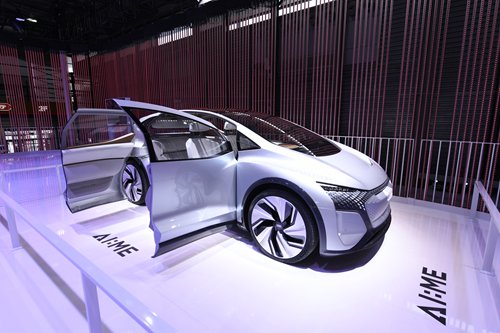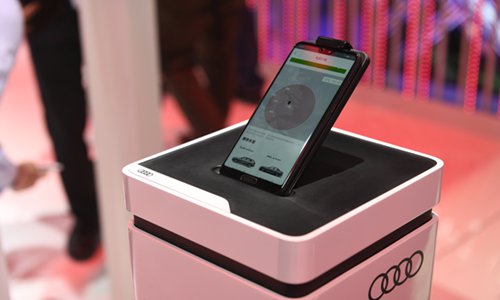HOME >> BUSINESS
Carmakers in innovation race at CES Asia
By Wang Yi in Shanghai Source:Global Times Published: 2019/6/13 17:23:40
Intelligence seen as future of vehicle industry

Audi showcased its concept car AI:ME at CES Asia 2019 in Shanghai from Tuesday to Thursday. Photo: Courtesy of Audi

Audi shows the next generation go e-tron system at CES Asia 2019 in Shanghai. Photo: Courtesy of Audi
Automakers from around the world competed to showcase future cars equipped with innovative technologies including artificial intelligence (AI), virtual reality (VR) and 5G at CES Asia 2019 in Shanghai in a bid to meet consumers' changing needs.
CES Asia, which has been referred to as a second Shanghai Auto Show due to the large presence of auto companies in past years, welcomed even more of them this year from Tuesday to Thursday. According to the official event data, car companies took up almost half of the exhibition area, and technology companies involved with the industry chain had a large presence in the other half.
A total of 39 auto companies brought nearly 90 next-generation products like autonomous driving systems, vehicle-mounted VR entertainment systems, 5G-powered remote-driving systems and new concept cars for future smart cities. They all vowed to provide consumers with smarter digital experiences.
Interconnection
Audi, a leading player in the China market, launched its next-generation connect technology and in-vehicle VR, and showcased the Audi e-tron and AI:ME during the event.
The new generation of Audi connect, an Android-based platform, allows third-party developers to create tailor-made services and applications. It will integrate digital assistant services like Alibaba's Tmall Genie Auto to allow consumers to remotely monitor and control smart appliances with voice commands.
Chinese consumers are always quick to adopt new trends. Audi is committed to bringing the latest connect technology to them, said Thomas Owsianski, Audi China president, on Tuesday. He stressed the importance of keeping pace with fast-developing consumer needs in the largest auto market in the world.
Wu Shuocheng, a Shanghai-based independent car analyst, told the Global Times on Wednesday that the moves by automakers like Audi show they are adapting to Chinese consumers' new need for connection.
"It's obvious that vehicles with smarter in-car operating systems that can connect to more devices will be more popular among Chinese consumers," Wu said.
Apart from car companies' new moves at the CES Asia 2019, technology companies developing vehicle-mounted devices or solutions in the auto industry chain aim to offer a new generation of in-car systems that will make cars smarter and connect cars as an important link of the Internet of Things.
In the Huawei-proposed "1+8+N" future smart life model, an in-car system is a key link among the eight smart terminals.
After Huawei's Shao Yang demonstrated the model on Tuesday at CES Asia 2019, Anshuman Sahu, an engineering representative from Maruti Suzuki, told the Global Times that the inspiring model has given him more ideas.
Yin Xiaohang, a senior executive of Audi China, told the Global Times on Tuesday that Huawei is an important partner of Audi in coming up with standards for connected cars, and the partnership with Huawei will enable users to access new automotive technologies.
Smart driving
HoloMatic, a Chinese start-up which is focused on autonomous driving, said it is working with major telecom carriers to conduct self-driving tests in the country, and its system could offer support for highway autonomous driving at up to 120 km per hour.
"In the future, drivers can get real-time road conditions on their operating interface in cars," a representative of HoloMatic told the Global Times on Tuesday.
Audi showcased e-tron, its concept car for smart cities, and presented its Go e-tron app at its booth at Asia's premier tech event, saying its proprietary car-to-everything technologies will open up new possibilities for making driving safer, more relaxed, and more intelligent.
At its booth at CES Asia 2019, Audi introduced an in-vehicle VR entertainment system named Holoride to the Chinese market.
Yun Kyoung-lim, executive vice president and head of Hyundai's Open Innovation Strategy Division, took the keynote stage on Tuesday and shared Hyundai's vision for the future of mobility. The company announced that it is cooperating with KuanDeng Technology, a self-driving technology supplier, to develop self-driving cars in China and South Korea. It is also working with UBiAi Technology, a connected car data application service provider, to transform the insurance industry using AI and data from driving.
Chinese automaker SAIC Motor on Tuesday demonstrated its 5G-powered remote driving system, which enables drivers to control vehicles about 50 kilometers away. The system could be used for scenarios including rescue work in disaster-hit areas, an engineer from the company told the Global Times on Tuesday.
While traditional leading market players showcased their next-generation car models at Asia's premier technology event, emerging start-ups producing NEVs took the exhibition as a chance to show their production capability and build their brands.
Hozon Auto, a Chinese NEV brand, showcased its Hozon U, an electric sport utility vehicle, at CES Asia 2019. The car is equipped with a robot that can identify voice commands and analyze big data.
New standard
Baidu at the CES Asia 2019 featured its open autonomous driving platform Apollo and its vehicle-mounted system Xiaodu OS. The company told the Global Times on Tuesday that its autonomous cars, which are being tested in Beijing, achieve a speed of 40 km per hour.
The draft of China's first information security standard for intelligent and automated connected vehicles issued by the China Association of Automobile Manufacturers (CAAM) on Tuesday was displayed at Baidu's booth.
China's auto industry is becoming stronger, and the keys are NEVs and intelligent connected vehicles, said Shi Jianhua, deputy secretary of the CAAM, according to the paper.cn.
The development of intelligent connected vehicles comes with a strategic opportunity, Shi said. "Making breakthroughs involving technology, models, markets and management are issues we need to think about."
The standard will assess 13 linkages including the central gateway and mobile terminals, and also assess data security and network security, the paper.cn reported.
Intelligent connected vehicles are only in their infancy, and the new standards could signal the access requirements for new entrants to the sector, Wu said.
With vast market prospects, intelligent and autonomous connected cars will attract more companies to participate. But because the technology is still developing, industry standards need to become industry regulations, he noted.
"Leading players that can join the rule-making process will undoubtedly secure a dominant role."
Posted in: INDUSTRIES,COMPANIES